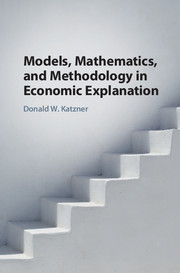Book contents
- Frontmatter
- Dedication
- Contents
- Preface
- Introduction
- 1 Science and Economics
- 2 Economic Models and Explanation
- 3 The Stages of Model Building in Economics
- 4 Models and Mathematics
- 5 Models and Measurement (or Lack Thereof)
- 6 Issues Relating to the Construction of Models from Scratch
- 7 An Example: The Efficiency of Organizational Forms
- 8 The Implicit Assumption Requirements of Later-Stage Model Building
- 9 Ordinality and the Adequacy of Analytic Specification
- 10 Categories of Models
- 11 Conclusion
- Index
4 - Models and Mathematics
Published online by Cambridge University Press: 26 October 2017
- Frontmatter
- Dedication
- Contents
- Preface
- Introduction
- 1 Science and Economics
- 2 Economic Models and Explanation
- 3 The Stages of Model Building in Economics
- 4 Models and Mathematics
- 5 Models and Measurement (or Lack Thereof)
- 6 Issues Relating to the Construction of Models from Scratch
- 7 An Example: The Efficiency of Organizational Forms
- 8 The Implicit Assumption Requirements of Later-Stage Model Building
- 9 Ordinality and the Adequacy of Analytic Specification
- 10 Categories of Models
- 11 Conclusion
- Index
Summary
Model building in economics is often, though not always, mathematical, and frequently a part of what is referred to as formalization. Indeed, the latter may be defined as the development and analysis of relations among variables that constitute part (or all) of an economic model. Justifications for the use of mathematics and formalization, and hence the mathematical type of model building, by economists (and others) go back quite some time. Cournot [2, pp. 2–5] and Jevons [10, pp. xxi–xxv, 3–5] believed that certain forms of reasoning in economics are mathematical in character. Walras [33, pp. 47,48] thought that to be scientific is, in part, to be mathematical. More recently, Suppes [30] provides seven reasons why formalization is desirable: It aids in the clarification of conceptual problems and the building of logical foundations, in the bringing out of explicit meanings of concepts, in standardizing terminology and methods, in permitting the development of a general vision without obstruction by inessential details, in allowing the attainment of a greater degree of objectivity, in setting out the precise conditions required for the analysis to be considered, and in obtaining the minimal assumptions necessary for statement of the analysis. Debreu [3, p. 275] cites linguistic convenience and the ability to obtain deeper understanding and analytical extensions that might not otherwise be possible. Mathematical reasoning, according to Gorman [5, p. 273], is important in economics because it helps in determining ”… what implies what. It is from the solid basis of such knowledge that one can make imaginative leaps into the unknown.” For Solow [29, p. 33], mathematical reasoning is preferred because, ceteris paribus, it is more exposed: ”… what you see is what you get.” And Weintraub [35, pp. 178,179] argues that, since we comprehend our economic world by creating mental structure, and since doing mathematics is creating mental structure in its “purest form,” mathematics is naturally important and relevant in economic analysis.
It should be noted that criticisms of the use of mathematics in economics are more often criticisms of the uses to which mathematics is put rather than the use of mathematics itself.
Information
- Type
- Chapter
- Information
- Models, Mathematics, and Methodology in Economic Explanation , pp. 80 - 100Publisher: Cambridge University PressPrint publication year: 2017
